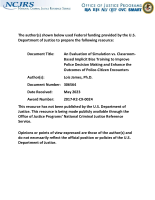Response Bias
Visual Imagery Ability and Multitrial Picture Recognition With Variant Verses Identity Cues
BIAS-MOTIVATED CRIMES: THEIR CHARACTERISTICS AND THE LAW ENFORCEMENT RESPONSE
Understanding and Evaluating Police Bias Crime Unit Practice and Impact
FBI Laboratory Decision Analysis Studies in Pattern Evidence Examinations
911, What's Your Emergency?: Factors Impacting Call Coding
An Evaluation of Simulation vs. Classroom-Based Implicit Bias Training to Improve Police Decision Making and Enhance the Outcomes of Police-Citizen Encounters
Understanding the Criminal Justice and Health Care Needs of Latinx Victims of Hate Crime and Bias Victimization
Diagnosing Crime and Diagnosing Disease: Bias Reduction Strategies in the Forensic and Clinical Sciences
Validity of Randomized Response for Sensitive Measurements
Cross-Burning Is Not Just an Arson: Police Social Construction of Hate Crimes in Baltimore County
Use of Pornography in the Criminal and Developmental Histories of Sexual Offenders
Community Views on Crime and Policing: Survey Mode Effects on Bias in Community Surveys
The Neurobiology of Sexual Assault: Implications for Law Enforcement, Prosecution, and Victim Advocacy
Dr. Campbell brings together research on the neurobiology of trauma and the criminal justice response to sexual assault. She explains the underlying neurobiology of traumatic events, its emotional and physical manifestation, and how these processes can impact the investigation and prosecution of sexual assaults. Real-world, practical implications are examined for first responders, such as law enforcement, nurses, prosecutors, and advocates.
See the YouTube Terms of Service and Google Privacy Policy
From the Academy to Retirement: A Journey Through the Policing Lifecycle
Professor Rosenbaum and a panel of colleagues discuss a study to demonstrate the feasibility of creating a foundation from which to launch studies about multiple aspects of policing using standardized definitions and measurement tools. Their goal is to advance knowledge about policing and translate data into evidence-based best practices that improve training, supervision and accountability systems. The effort is expected to produce a better understanding of what motivates police officers and makes them healthier, happier and more effective.
See the YouTube Terms of Service and Google Privacy Policy



